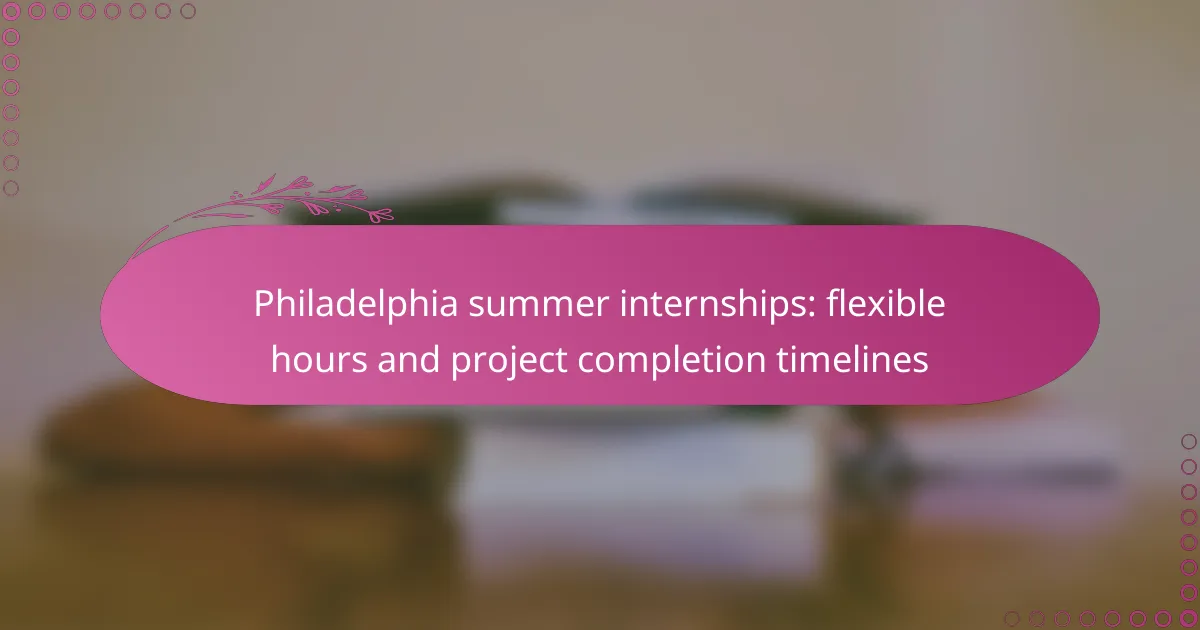

What are Philadelphia summer internships?
Philadelphia summer internships are temporary work opportunities offered during the summer months. These internships are typically designed for college students or recent graduates. They provide practical experience in a specific field or industry. Many internships in Philadelphia are unpaid or offer a stipend. Interns may work flexible hours to accommodate their schedules. The projects assigned often have specific completion timelines. This structure allows interns to develop skills while contributing to real-world projects. Philadelphia hosts a diverse range of internships across various sectors, including business, healthcare, and technology.
How do Philadelphia summer internships differ from other internships?
Philadelphia summer internships often feature more flexible hours compared to internships in other cities. This flexibility allows interns to balance work with summer activities and academic commitments. Additionally, Philadelphia internships may emphasize project completion timelines that align with local industry standards. Many companies in Philadelphia focus on real-world projects that interns can complete during their tenure. This hands-on approach can enhance learning experiences. Furthermore, Philadelphia’s internship market may offer unique networking opportunities due to its diverse industries. These factors collectively differentiate Philadelphia summer internships from those in other regions.
What unique opportunities do Philadelphia summer internships provide?
Philadelphia summer internships provide access to diverse industries and professional networks. Interns can work in sectors such as healthcare, technology, and finance. The city is home to numerous Fortune 500 companies and startups. This environment fosters unique learning experiences and mentorship opportunities. Interns can gain hands-on experience that enhances their resumes. Flexible hours allow interns to balance work with academic commitments. Project completion timelines vary, accommodating different student schedules. This adaptability enables interns to engage in meaningful work while pursuing their studies.
How do local industries influence internship offerings in Philadelphia?
Local industries significantly influence internship offerings in Philadelphia by shaping demand for specific skills. Industries such as healthcare, technology, and finance drive the creation of internships tailored to their needs. For instance, the healthcare sector often seeks interns with backgrounds in biology or public health. Similarly, tech companies look for candidates skilled in programming and data analysis.
This alignment between industry requirements and internship offerings ensures that students acquire relevant experience. According to the Philadelphia Chamber of Commerce, local businesses reported a 30% increase in internship positions over the past five years. This trend reflects the growing need for a skilled workforce that meets industry standards.
Moreover, local industries often collaborate with educational institutions to design internship programs. These partnerships help ensure that the curriculum aligns with real-world job requirements. As a result, students are better prepared for employment after graduation.
Why are flexible hours important for summer internships?
Flexible hours are important for summer internships because they accommodate students’ varying schedules. Many interns juggle classes, part-time jobs, and personal commitments. Flexible hours allow interns to work when they are most productive. This can lead to higher quality work and increased job satisfaction. A study by the National Association of Colleges and Employers found that 70% of students prefer flexible work arrangements. Additionally, organizations that offer flexibility attract a broader talent pool. This can enhance the overall internship experience for both interns and employers.
How do flexible hours benefit interns in Philadelphia?
Flexible hours benefit interns in Philadelphia by allowing them to balance work and personal commitments. This flexibility can lead to increased productivity and job satisfaction. Interns can schedule their work around classes or other responsibilities. Research shows that flexible work arrangements can enhance employee engagement. According to a study by the Harvard Business Review, flexible hours lead to lower stress levels. This is particularly important for interns managing multiple roles. Additionally, flexible hours can improve attendance rates. Interns are more likely to complete projects on time when they can work during their most productive hours.
What challenges do employers face with flexible hours for internships?
Employers face several challenges with flexible hours for internships. Coordination becomes complex when interns have varying schedules. This can lead to difficulties in team collaboration and project management. Communication may suffer if interns are not available at the same time as their supervisors. Additionally, tracking intern productivity can be challenging without set hours. Employers may also struggle with maintaining a consistent company culture. Training and onboarding can become inconsistent with flexible hours. Finally, there is a risk of interns feeling isolated without regular interaction. These factors can impact the overall success of the internship program.
What are project completion timelines in Philadelphia summer internships?
Project completion timelines in Philadelphia summer internships typically span from 8 to 12 weeks. Most internships begin in late May or early June and conclude in August. Interns are expected to complete assigned projects within this timeframe. Specific deadlines may vary based on the organization and project scope. For example, some internships may have interim milestones for progress evaluations. These timelines ensure that interns gain practical experience while contributing to the organization’s goals. Interns often receive guidance and feedback throughout the project duration. This structure helps maintain a productive learning environment.
How are project timelines structured in these internships?
Project timelines in Philadelphia summer internships are typically structured around specific milestones and deadlines. Interns often receive a clear outline of their project goals at the start. This outline includes key phases such as research, development, and presentation. Each phase has designated timeframes to ensure timely completion. Regular check-ins with supervisors help track progress and adjust timelines as needed. This structured approach promotes accountability and effective time management. Flexibility is also a key aspect, allowing interns to adapt to changing project demands while meeting deadlines.
What factors can affect project completion timelines?
Project completion timelines can be affected by several factors. These include resource availability, which refers to the materials and personnel needed for the project. Delays in obtaining these resources can extend timelines. Stakeholder engagement is another factor; lack of communication can lead to misunderstandings and project slowdowns.
Project scope changes also impact timelines. When the scope expands, additional time is needed to complete the work. Team dynamics play a crucial role too; conflicts within the team can hinder progress. External factors, such as regulatory changes or market conditions, can also introduce delays.
Finally, project management practices significantly influence timelines. Effective planning and monitoring can keep a project on track. According to the Project Management Institute, poor project management can lead to a 70% failure rate in project completion.
How do flexible hours and project timelines impact intern experience?
Flexible hours and project timelines significantly enhance the intern experience. Interns benefit from the ability to manage their schedules. This flexibility allows them to balance work and personal commitments effectively. Additionally, adjustable project timelines enable interns to focus on quality rather than speed. They can invest time in learning and skill development. Research indicates that flexibility leads to higher job satisfaction among interns. A study by the National Association of Colleges and Employers found that interns with flexible arrangements reported a 20% increase in overall satisfaction. This positive experience can lead to better performance and retention rates for both interns and organizations.
What skills can interns develop through flexible schedules and project work?
Interns can develop time management, adaptability, and project management skills through flexible schedules and project work. Flexible schedules allow interns to prioritize tasks effectively. This fosters time management by enabling them to allocate their hours based on project deadlines. Adaptability is enhanced as interns learn to adjust to changing project requirements and timelines. Project work cultivates project management skills by requiring interns to plan, execute, and evaluate their tasks. Research shows that internships with flexible structures lead to higher skill acquisition rates. A study by the National Association of Colleges and Employers found that 70% of interns reported improved organizational skills through such experiences.
How do flexible hours enhance work-life balance for interns?
Flexible hours enhance work-life balance for interns by allowing them to manage their schedules according to personal commitments. This flexibility reduces stress and promotes well-being. Interns can attend classes, family obligations, or personal appointments without sacrificing work responsibilities. Research indicates that flexible work arrangements lead to higher job satisfaction. A study by the American Psychological Association found that employees with flexible hours report lower levels of stress. This balance can improve productivity and engagement in their internship roles. Ultimately, flexible hours support a healthier work-life integration for interns.
What project management skills are gained from completing internship projects?
Internship projects help develop key project management skills. These skills include time management, as interns learn to prioritize tasks effectively. Interns also gain experience in team collaboration, enhancing their ability to work with diverse groups. Problem-solving skills improve as interns face real-world challenges and seek solutions. Communication skills are honed through regular updates and presentations to supervisors. Additionally, interns learn to set realistic goals and track progress, which is essential in project management. Research by the Project Management Institute highlights that hands-on experience significantly boosts these competencies in interns.
What are best practices for managing flexible hours and project timelines in internships?
Establishing clear communication is essential for managing flexible hours and project timelines in internships. Interns should have regular check-ins with supervisors to discuss expectations. Setting specific deadlines for project milestones helps track progress. Utilizing project management tools can enhance organization and accountability. Flexibility should be balanced with structure to ensure productivity. Interns should document their hours and tasks for transparency. Feedback should be provided consistently to guide performance. These practices lead to effective management of flexible schedules and timelines.
Philadelphia summer internships are temporary work opportunities available during the summer months, primarily aimed at college students and recent graduates. These internships provide practical experience across various sectors, including business, healthcare, and technology, often featuring flexible hours and specific project completion timelines. The article explores how these internships differ from others, the unique opportunities they offer, and the influence of local industries on internship offerings. Additionally, it discusses the significance of flexible hours and structured project timelines in enhancing the intern experience and skill development. Best practices for managing these aspects to ensure productivity and satisfaction are also outlined.





